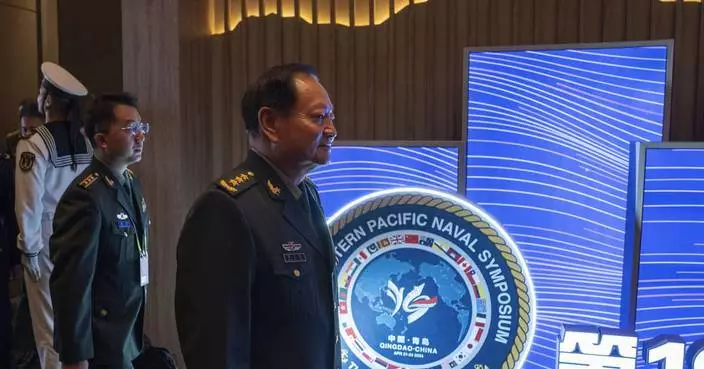Sigrid Nunez's "The Friend," a meditative novel about grief, books and, not least, a Great Dane named Apollo, has won the National Book Award for fiction. Other winners Wednesday night included Jeffrey C. Stewart's "The New Negro: The Life of Alain Locke" for nonfiction and Justin Philip Reed's "Indecency for poetry.
During a ceremony and dinner benefit at Cipriani Wall Street when those honored had roots throughout the world, from Peru to Japan, Elizabeth Acevedo's "The Poet X" won for young people's literature, and Yoko Tawada's "The Emissary," translated by Margaret Mitsutani, won for translation, a category newly revived.
Nunez's book tells of a woman mourning the death of her literary mentor and of her bond with the dog he left behind. It is a story, in part, of connection and distance. And Nunez, author of such previous novels as "Salvation City" and "The Last of Her Kind," noted in her acceptance speech that she didn't seek community when she became a writer, but unexpectedly found it.
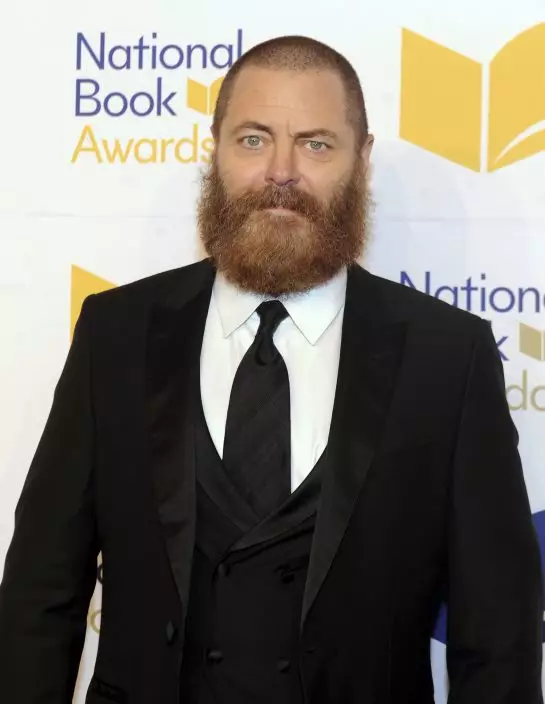
Nick Offerman attends the 69th National Book Awards Ceremony and Benefit Dinner at Cipriani Wall Street on Wednesday, Nov. 14, 2018, in New York. (Photo by Brad BarketInvisionAP)
"I thought it was something I could do alone and hidden, in the privacy of my own room," she said. "How lucky to have discovered that writing books made the miraculous possible, to be removed from the world and be part of the world at the same time.
"And tonight how happy I am to feel a part of the world."
Nunez's novel was chosen from among five fiction works set mostly in the present, and touching with lyricism and intensity upon everything from race and sexuality to climate change. Finalist Jamel Brinkley, author of the story collection "A Lucky Man," told The Associated Press earlier Wednesday that "Our lives vibrate with uncertainty and mystery, with paths precariously taken or not taken, and they are often under threat by one thing or another. Many of our lives are under threat by design." Lauren Groff, a nominee for the story collection "Florida," said that "In these frightening and fraught times, I had to come into the full certainty that art was meaningful enough for me to devote my heart to it."
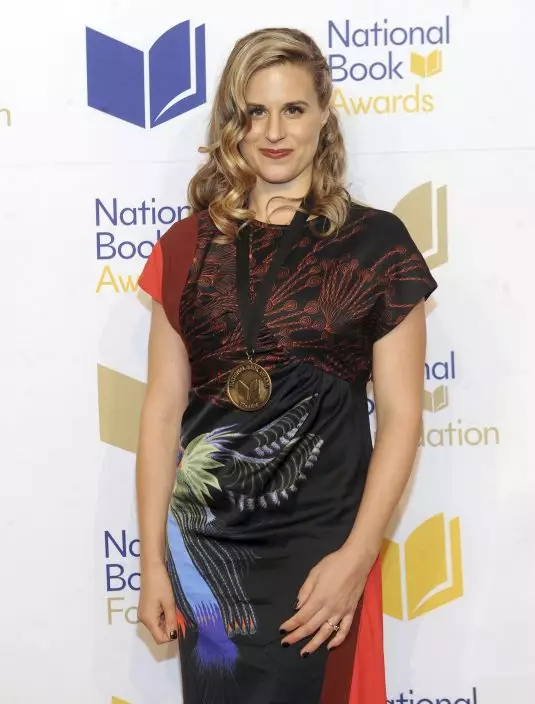
Lauren Groff attends the 69th National Book Awards Ceremony and Benefit Dinner at Cipriani Wall Street on Wednesday, Nov. 14, 2018, in New York. (Photo by Brad BarketInvisionAP)
"Parks and Recreation" actor Nick Offerman served as master of ceremonies and soon learned that among the publishing community you're more likely to get cheers with tributes to reading than with double entendre about "thumb drives." One popular line: "In an age when our First Amendment rights and truth itself are very much in peril, books remain the ultimate repository of creative ideas and irreplaceable knowledge."
Honorary medals were given to novelist Isabel Allende and to Doron Weber of the Alfred P. Foundation for its support of books about the sciences. Weber was introduced by "Hidden Figures" author Margot Lee Shetterly, one of hundreds the foundation has helped support. Referring to concerns new and old, Weber called for the protection of "nonpartisan forms of knowledge" and the continued dialogue between art and science.
"We continue to invite scientists and humanists to engage one another," he said, calling them "two side of the same human impulse to understand and meaningfully describe the world around us and inside us."
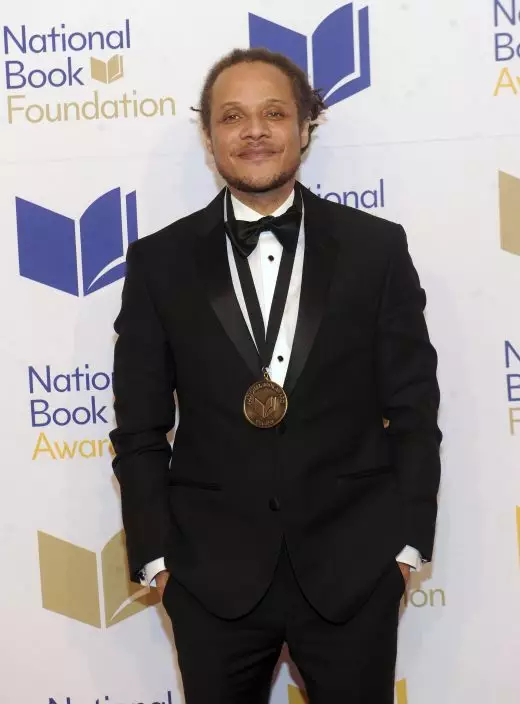
Jamel Brinkley attends the 69th National Book Awards Ceremony and Benefit Dinner at Cipriani Wall Street on Wednesday, Nov. 14, 2018, in New York. (Photo by Brad BarketInvisionAP)
Allende, author of "The House of the Spirits" and many other best-sellers, is the first Spanish language writer to receive an honorary National Book Award medal. A native of Peru, she has lived in the U.S. since the 1980s and for years was a political refugee from Chile during the dictatorship of Augusto Pinochet.
"Although I am critical of many things in this country I am proud to be an American citizen. I have received much more than I ever dreamed of and I have been offered the opportunity to give something back," she said.
Allende said she has been an outsider, in transit, for much of her life. She spoke of her award as a kind of deed of ownership, a sign that she is home.
"Maybe I'm not an alien after all. Maybe it's time to plant my roots and relax," she said. "Maybe I'm not going anywhere, anymore."
The book awards are presented by the nonprofit National Book Foundation. Judges, who include writers, critics and other members of the literary community, chose from more than 1,600 books submitted by publishers when considering the awards. Winners in the competitive categories each receive $10,000. In translation, the prize money is divided between the author and translator.
KYIV, Ukraine (AP) — A big, new package of U.S. military aid will help Ukraine avoid defeat in its war with Russia. Winning will still be a long slog.
The arms and ammunition in the $61 billion military aid package should enable Ukraine to slow the Russian army's bloody advances and block its strikes on troops and civilians. And it will buy Ukraine time — for long-term planning about how to take back the fifth of the country now under Russian control.
“Ultimately it offers Ukraine the prospect of staying in the war this year,” said Michael Clarke, visiting professor in war studies at King’s College London. “Sometimes in warfare you’ve just got to stay in it. You’ve just got to avoid being rolled over.”
The U.S. House of Representatives approved the package on Saturday after months of delays by some Republicans wary of U.S. involvement overseas. It was passed by the Senate on Tuesday, and President Joe Biden said he would sign it Wednesday.
The difference could be felt within days on the front line in eastern and southern Ukraine, where Russia’s much larger army has been slowly taking territory against massively outgunned Ukrainian forces.
The aid approval means Ukraine may be able to release artillery ammunition from dwindling stocks that it has been rationing. More equipment will come soon from American stocks in Poland and Germany, and later from the U.S.
The first shipments are expected to arrive by the beginning of next week, said Davyd Arakhamia, a lawmaker with Ukrainian President Volodymyr Zelenskyy’s Servant of the People party.
But opposition lawmaker Vadym Ivchenko, a member of the Ukrainian parliament’s National Security, Defense and Intelligence Committee, said logistical challenges and bureaucracy could delay shipments to Ukraine by two to three months, and it would be even longer before they reach the front line.
While details of the shipments are classified, Ukraine’s most urgent needs are artillery shells to stop Russian troops from advancing, and anti-aircraft missiles to protect people and infrastructure from missiles, drones and bombs.
What’s coming first is not always what front-line commanders need most, said Arakhamia, the Ukrainian lawmaker. He said that even a military giant like the U.S. does not have stockpiles of everything.
“The logic behind this first package was, you (the U.S.) finds our top priorities and then you see what you have in the warehouses,” Arakhamia said. “And sometimes they do not match.”
Hope for future breakthroughs for Ukraine still hangs on more timely deliveries of Western aid, lawmakers acknowledge.
Many experts believe that both Ukraine and Russia are exhausted by two years of war and won’t be able to mount a major offensive — one capable of making big strategic gains — until next year.
Still, Russia is pushing forward at several points along the 1,000-kilometer (600-mile) front, using tanks, wave after wave of infantry troops and satellite-guided gliding bombs to pummel Ukrainian forces. Russia is also hitting power plants and pounding Ukraine’s second-largest city, Kharkiv, which is only about 30 kilometers (some 20 miles) from the Russian border.
Ivchenko said the goal for Ukraine’s forces now is to “hold the line” until the bulk of new supplies arrive by mid-summer. Then, they can focus on trying to recapture territory recently lost in the Donetsk region.
“And probably ... at the end of summer we’ll see some movement, offensive movement of the Ukrainian armed forces,” he said.
Some military experts doubt Ukraine has the resources to mount even small offensives very soon.
The U.S. funding “can probably only help stabilize the Ukrainian position for this year and begin preparations for operations in 2025,” said Matthew Savill, director of military sciences at the Royal United Services Institute, a think tank.
In the best-case scenario for Ukraine, the American aid will give commanders time to reorganize and train its army — applying lessons learned from its failed summer 2023 offensive. It may also galvanize Ukraine’s allies in Europe to increase aid.
“So this just wasn’t about Ukraine and the United States, this really affected our entire 51-country coalition,” said U.S. Congressman Bill Keating, a Democrat who visited Kyiv on Monday as part of a four-member congressional delegation.
Zelenskyy insists Ukraine's war aim is to recapture all its territory from Russia — including Crimea, seized illegally in 2014. Even if the war ultimately ends through negotiation, as many experts believe, Ukraine wants to do that from as strong a position as possible.
Whatever happens on the battlefield, Ukraine still faces variables beyond its control.
Former U.S. President Donald Trump, who seeks to retake the White House in the November election, has said he would end the war within days of taking office. And the 27-nation Europe Union includes leaders like Hungarian Prime Minister Viktor Orbán and Slovak Prime Minister Robert Fico, who have opposed arming Ukraine.
Ukraine’s allies have held back from supplying some arms out of concern about escalation or depleting their own stocks. Ukraine says that to win the war it needs longer-range missiles it could use for potentially game-changing operations such as cutting off occupied Crimea, where's Russia's Black Sea fleet is based.
It wants a longer-range version of Army Tactical Missile Systems, known as ATACMs, from the U.S. and Taurus cruise missiles from Germany. Both governments have resisted calls to send them because they are capable of striking targets deep within Russian territory.
The new bill authorizes the president to send Ukraine the longer-range ATACMS, which have a range of some 300 kilometers (190 miles), “as soon as practicable.” It's unclear what that will mean in practice.
Sometimes, promised weapons have arrived late, or not at all. Zelenskyy recently pointed out that Ukraine is still waiting for the F-16 fighter jets it was promised a year ago.
Meanwhile, Russia is using its advantage in troops and weapons to push back Ukrainian forces, perhaps seeking to make maximum gains before Ukraine's new supplies arrive.
For weeks it has pummeled the small eastern city of Chasiv Yar, suffering heavy losses. Britain's Ministry of Defense says 900 Russian troops are being killed or injured a day in the war.
Capturing the strategically important hill town would allow them to move toward Sloviansk and Kramatorsk, key cities Ukraine controls in the eastern region of Donetsk. It would be a significant win for Russian President Vladimir Putin, who Western officials say is bent on toppling Ukraine’s pro-Western government.
Russian pressure was aimed not just at gaining territory, but on undermining Zelenskyy and bolstering critics who say his war plan is failing, said Clarke of King's College London.
The U.S. aid package decreases the likelihood of a political crisis in Ukraine, and U.S. Speaker Mike Johnson deserves credit for pushing it through Congress, he said.
"He held history in his hands,” Clarke said.
This story has been updated to correct Orbán's title, the Slovak prime minister's name and that the British estimate of daily Russian losses is for the war, not one battle.
Follow AP’s coverage of the war in Ukraine at https://apnews.com/hub/russia-ukraine
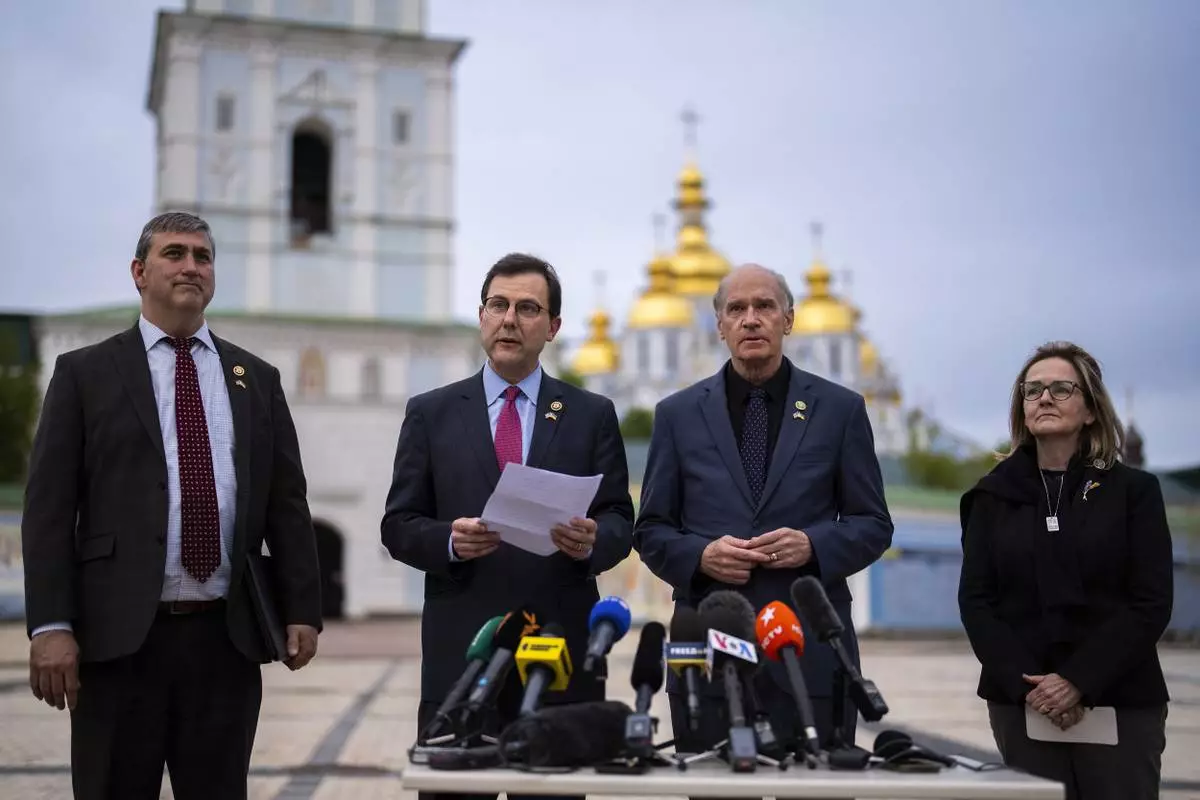
From left, U.S. representatives Nathaniel Moran, R-Tx, Tom Kean Jr, R-NJ, Bill Keating, D-Mass, and Madeleine Deane, D-Pa, talk to journalists during a joint news conference outside Saint Michael cathedral in Kyiv, Ukraine, Monday, April 22, 2024. A newly approved package of $61 billion in U.S. aid may prevent Ukraine from losing its war against Russia. But winning it will be a long slog. (AP Photo/Francisco Seco)
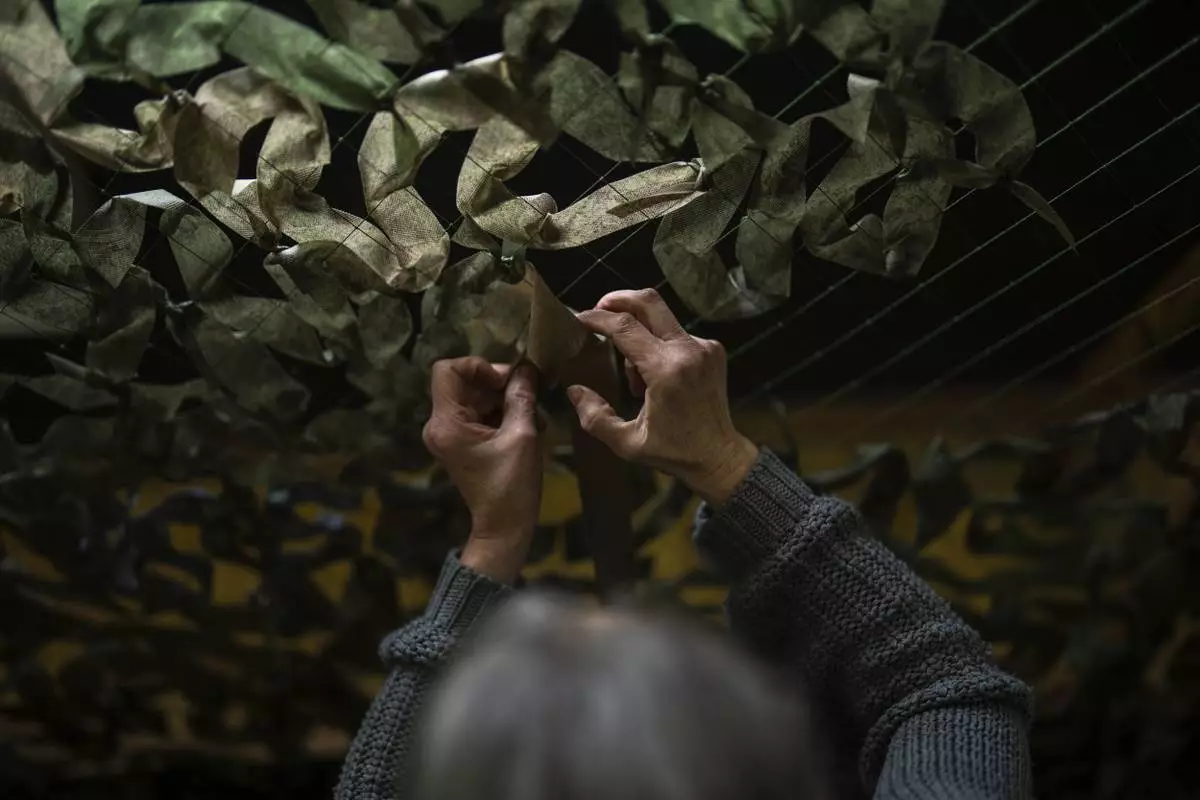
A volunteer makes a camouflage net at a facility producing material for Ukrainian soldiers in Kyiv, Ukraine, Monday, April 22, 2024. A newly approved package of $61 billion in U.S. aid may prevent Ukraine from losing its war against Russia. But winning it will be a long slog. (AP Photo/Francisco Seco)
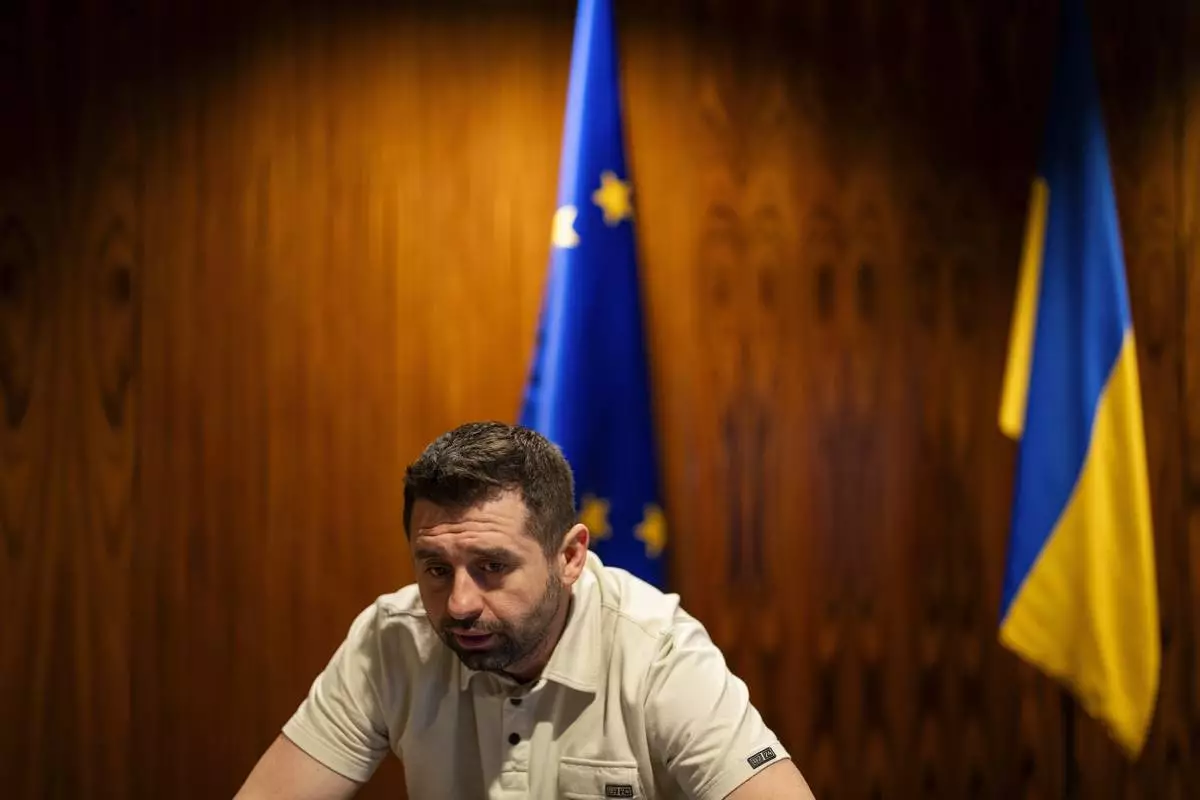
Davyd Arakhamia, a lawmaker with Ukrainian President Volodymyr Zelenskyy's Servant of the People party, talks during an interview with Associated Press in Kyiv, Ukraine, Monday, April 22, 2024. (AP Photo/Francisco Seco)
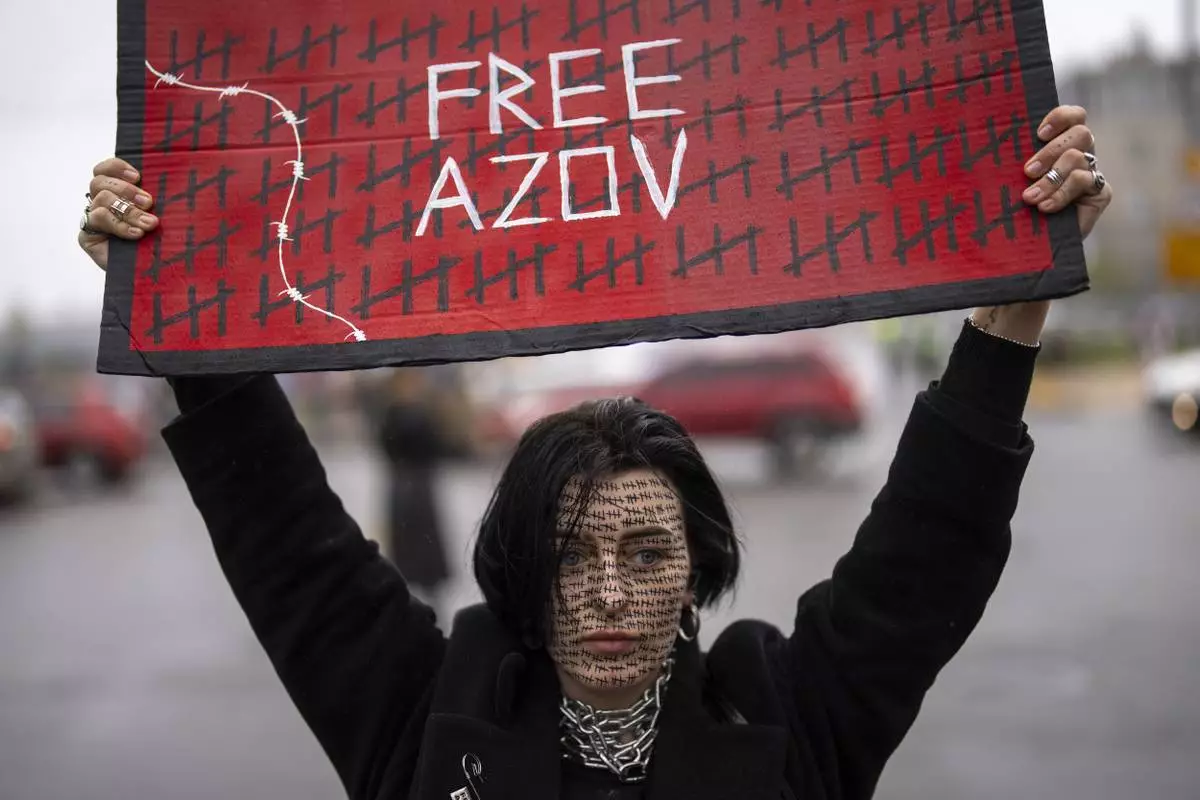
A woman rallies to raise awareness on the fate of Ukrainian prisoners of war in Kyiv, Ukraine, Sunday, April 21, 2024. (AP Photo/Francisco Seco)
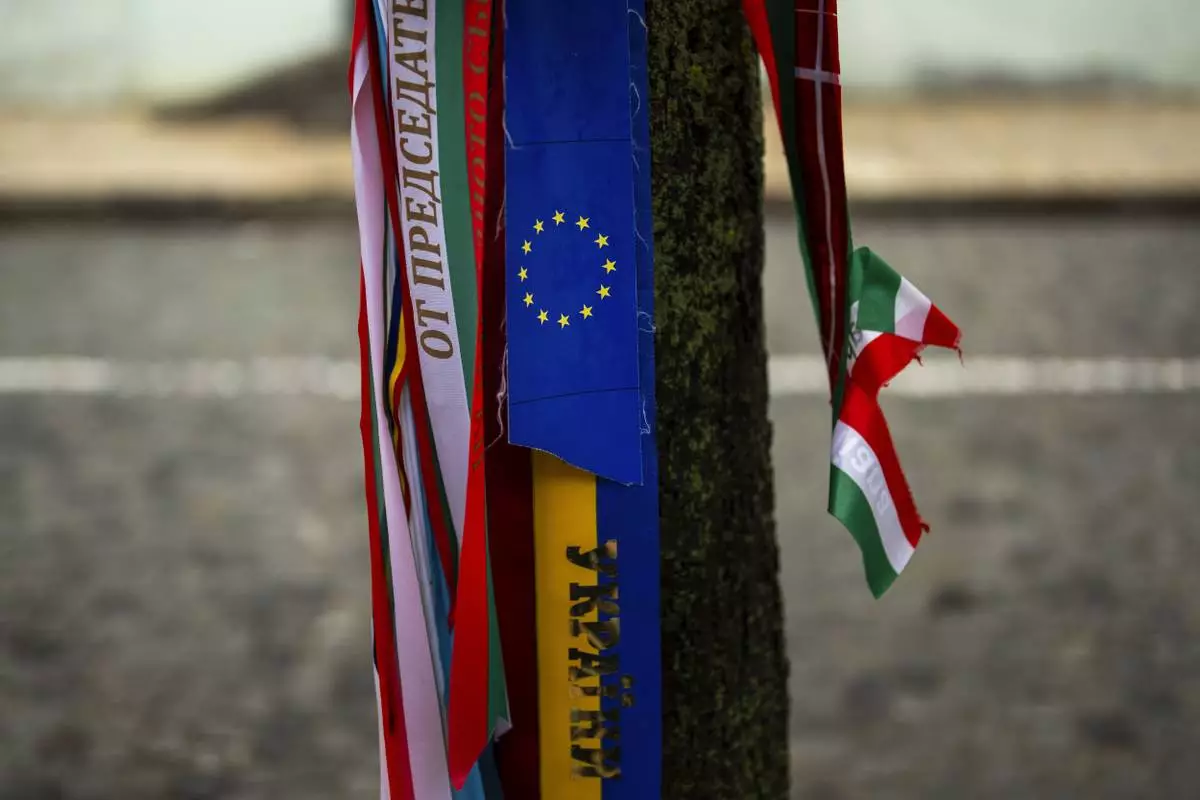
Ribbons with the colors of the European Union and Ukraine are attached to a tree next to memorial wall of Ukrainian soldiers killed during the war in Kyiv, Ukraine, Monday, April 22, 2024. (AP Photo/Francisco Seco)
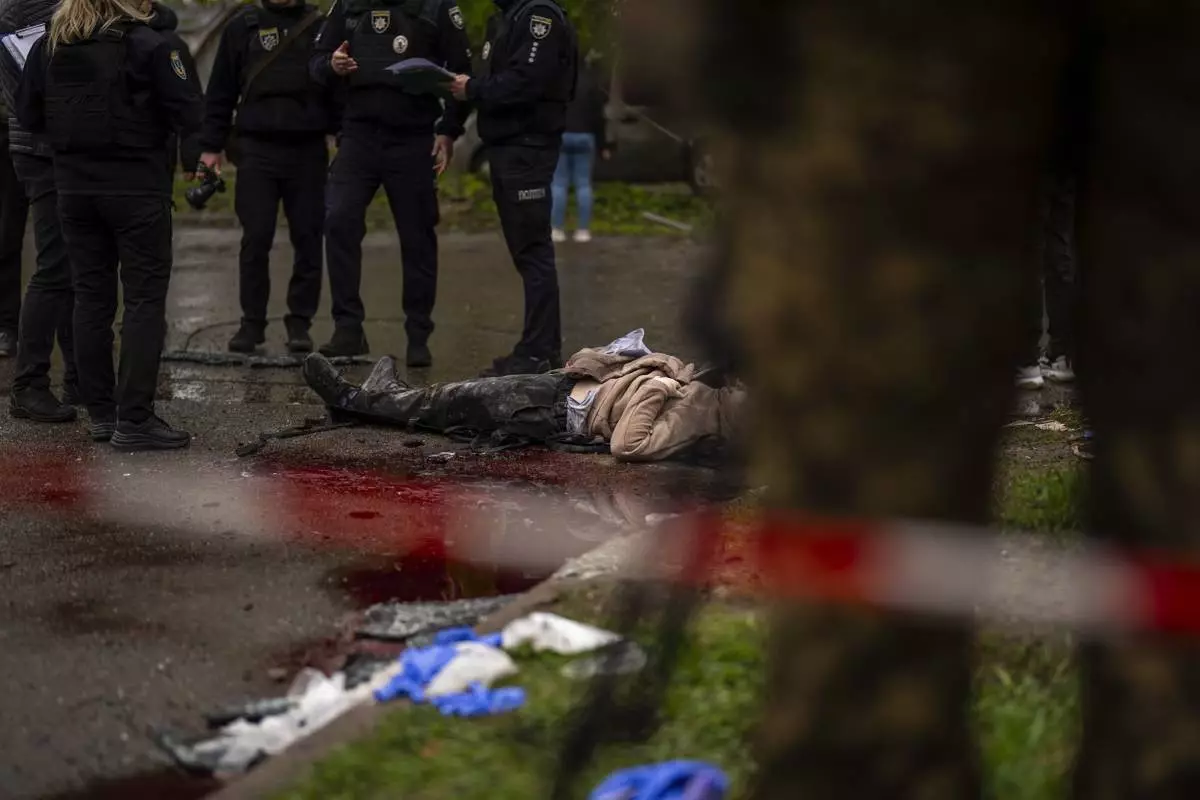
The body of a woman killed by Russian bombardment in Chernihiv, Ukraine, Wednesday, April 17, 2024. (AP Photo/Francisco Seco)

Soldiers carry the coffins of two Ukrainian army sergeants during their funeral in Lviv, Ukraine, Tuesday, April 16, 2024. (AP Photo/Francisco Seco)



















